Polish Rifles for the Polish Armed Forces. MSBS Modular Firearms System
Polish Armed Forces have, for a long time, been operating numerous types of firearms, however, never before has an entirely new design been introduced as the primary individual weapon for the soldiers. The aforesaid situation may be soon changed, once the MSBS system is introduced into the inventory of the military. Its design makes it possible to make use of a single carbine in several different fields of application.
The key meaning within the MSBS system (Modułowy System Broni Strzeleckiej – Modular Firearms System) is borne by the chamber solution, which is shared by two of the proposed weapon designs – conventional and bull-pup one. It forms a base, to which the remaining modules of the weapon are being attached. In this way, the user of the MSBS system may obtain up to 11, tactically different, firearm designs, within a single family of weapons.
Creating both bull-pup, as well as conventional rifle design makes it possible to tailor the weapon to specific conditions or even to the individual preferences of the user. Both of the aforesaid solutions, commonly utilized in firearms design, have a number of specific advantages and disadvantages.
The classic design is better suited to any anatomy of the shooter, however, the firearm itself is very long in this case. Bullpup variant on the other hand, with its barrel being of similar, or even greater length, is 30% shorter, however it is also limited when it comes to the adaptability for any user, due to the distance between the stock base and the pistol grip. For numerous shooters, this is hard to accept. In such situation, the shooter’s face is placed close to the muzzle, and thus it is exposed to numerous factors accompanying the shooting process.
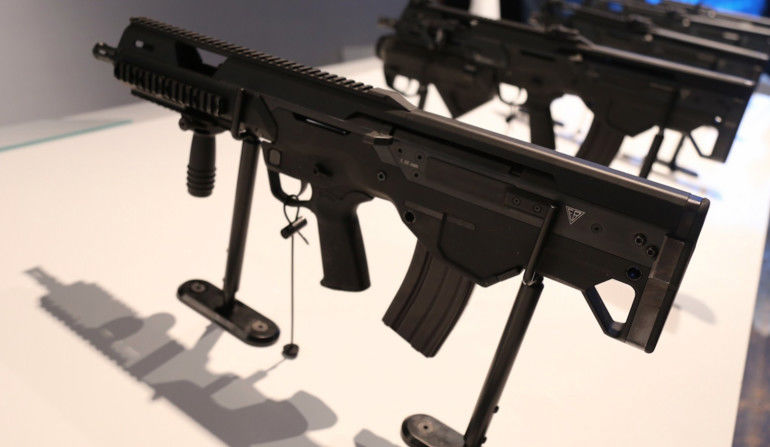
The modular design concept remains a well known and highly valued solution. A similar idea has been adopted in case of the FN SCAR system, operated, among other users, by the US SOCOM. The modular and universal profile of the modern firearms is destined to contribute to the user’s advantage over the potential enemy, however this trend is also aimed at improving the user comfort and limiting the operational cost.
MSBS has been designed as a weapon shooting the 5.56×45 mm NATO round. At the moment, the firearm in question comes in five different variants with conventional designs, and five coming in a bull-pup form (MSBS-5.56K and MSBS-5.56B respectively). The weapons family includes a sub-carbine, basic carbine, a carbine with a grenade launcher, sniper rifle and a machine gun. MSBS-R variety of the weapon, on the other hand, has also been designed for the army ceremonial units, or for their counterparts within the other uniformed services. The said variant of the rifle has been, as the first one, acquired both by the Polish Armed Forces, as well as by the prison officers.
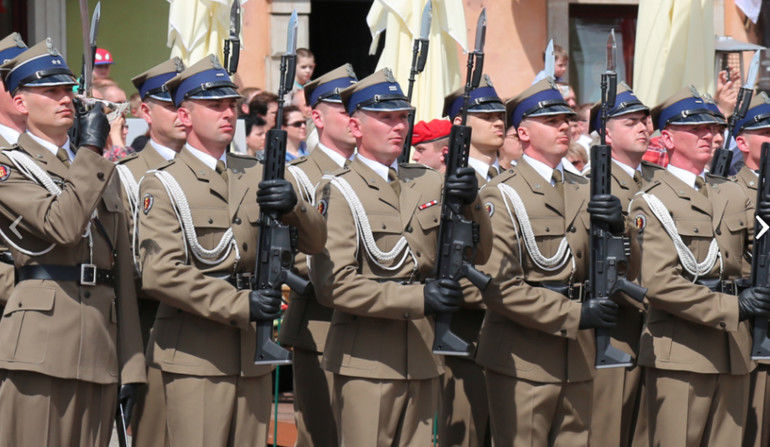
It is also expected that a variant custom-tailored to utilize the 7.62×51 mm NATO round will also be developed, under the name of MSBS-7.62. Considering the army’s interest in a semi-automatic sniper rifle, the initial work was driven towards designing a conventional layout rifle with a precise-machined barrel and a fixed stock, in case of which though, the butt pad and cheek rest are adjustable, within a wide range of settings. The first firing tests have been planned to take place this year. Ultimately, all variants of the MSBS rifle using the 7.62 mm round, similar to the ones utilizing the 5.56×45 mm ammunition, would be developed, along with a magazine-fed machine gun. The weapon has also been adopted to use the Russian 7.62×39 mm ammunition utilized in case of the AKMS and derivative rifles.
Design Genesis
The concept of replacing the Kalashnikov family weapons in the Polish Army has been created at the Military University of Technology, at the beginning of the 21st Century. The MSBS family of rifles has been in development since the year 2007, when the development project of a new modular 5.56 rifle has been initiated, with the intention of creating a weapon for the Polish Army. The initiative has been implemented jointly by the Military University of Technology (WAT) and by the Łucznik-Radom Firearms Factory (FB). Until the year 2011, general concepts of the system and rifle demonstrators of both designs have been created. Within that period, the shape of the weapon has also been evolving, with its ergonomics and functionality both being enhanced.
Starting from November 2011, the MSBS R&D project was initiated, including, alongside the classic layout MSBS-5.56K weapon, development works concerning an underslung 40 mm grenade launcher and a bayonet. Within that process 4 models and 12 prototypes have been built. Meanwhile, Military University of Technology, together with the Radom facility, have founded a research-industrial consortium, tasked with researching and creating the MSBS system.
Back in 2012, National Centre For Research and Development has finalized the competition no. 3/2012, which resulted in a request to provide funding for the MSBS development programme, within the period between 2012 and 2016. The weapon developed within the MSBS project is to become, ultimately, the primary weapon of the advanced individual Tytan soldier ensemble.
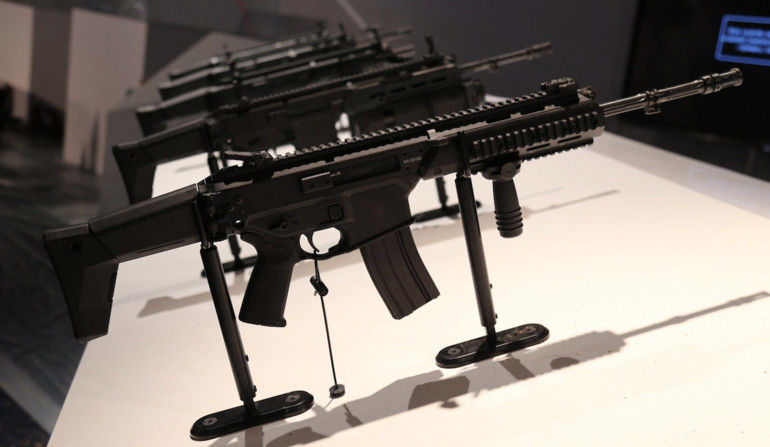
In the late 2016, the initial qualification test programme for the MSBS-5.56K rifle began, with the planned implementation term scheduled to last from 6 to 8 months. Up until now, 200 part sets have been created, required to build the MSBS-5.56 rifles, also a batch of the ceremonial MSBS-5,56R weapons has been delivered for the Polish Army’s ceremonial battalion: 150 examples; and 40 examples have been delivered for the Prison Guards representative company.
During the subsequent years, similar tests have been planned with regards to the MSBS-5,56K conventional subcarbine and to the MSBS-5,56B basic bullpup assault rifle.
Design
As mentioned above, all of the variants utilize a common chamber, slide and lock, and the recoil assembly, which may be coupled with the remaining interchangeable modules, including triggers, barrels, stocks or grips. After one changes the trigger module, stock butt and uses a proper set of connectors, along with the chamber top element and a cheek rest, one may create a bullpup variant.
All of the control elements of the weapon are ambidextrous. They have been doubled redundantly on both sides of the gun (firing selector and safety, slide release, magazine release), or placed within the central portion of the rifle (cocking handle).
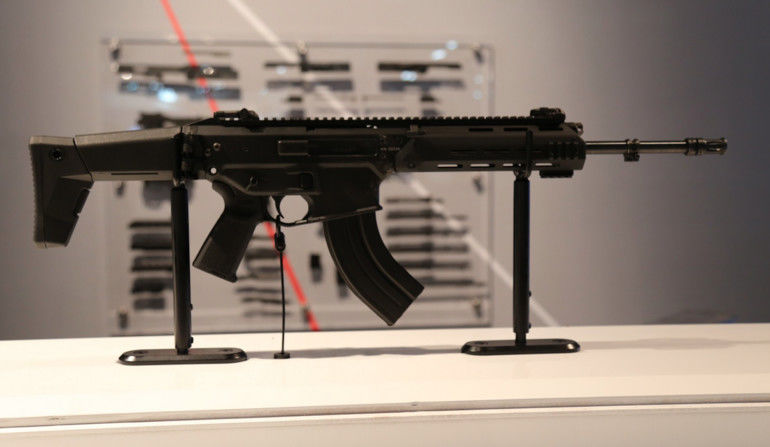
The weapon has an adjustable gas-operation system, making it possible to use a suppressor.
The stock in the conventional rifles is identical for each and every variant, it is foldable and has an adjustable length, it has also been fitted with a three-positions cheek rest. In the ceremonial variant, a fixed stock has been applied, with reinforced buttstock.
In any variant, an iron sight is available (folded front sight and rear sight), installed on the rail. The sights are made out of metal, and they feature a front sight support and rear sight aperture with two settings, for shooting at the distance of up to 200 meters.
The barrels also vary in length, from 256 mm subcarbine one (with a flash suppressor or a moderator – for the bull-pup variant), through 406 mm in case of the standard variant, up to the 508 mm barrel of smaller diameter, used in case of the ceremonial MSBS-5,56R weapon. Whereas, the 406 mm barrel applied in the machine gun has a heavier profile, while the one utilized in case of the sniper rifle has been precisely machined, within a narrow tolerance range.
The muzzle end is tailored to mount a silencer. Also, the MSBS-7.62 mm semi-automatic sniper rifle 508 mm (or 406 mm) barrel may be changed and replaced in the field too. The barrel of the rifle using the Russian ammunition has a length of 395 mm (and was created as a modified variant of the original 406 mm barrel).
The rifle features a top universal Picatinny rail, as well as mounts for side rails. This makes it possible for he user to utilize accessories such as frond grips, tactical flashlights, lasers, as well as aiming devices of a variety of types, including optical, night vision, thermal vision or reflector sights.
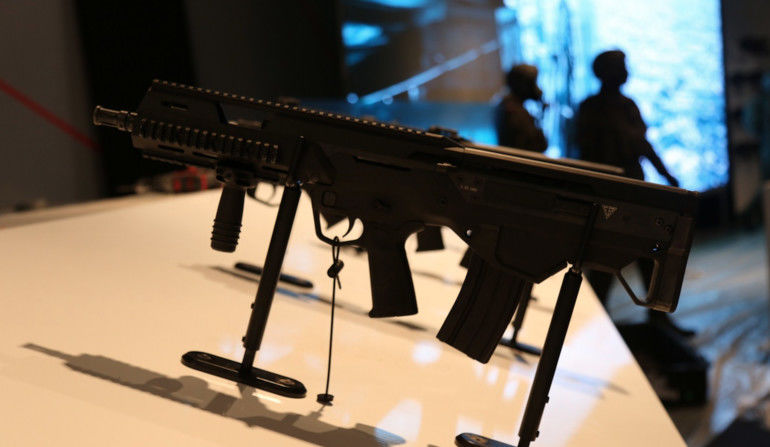
A single shot 40×46SR NATO grenade launcher may be slung under the rifle too. The bayonet utilized with the MSBS Carbine features an innovative pouch design, and an unconventional way of being mounted on the weapon.
The rifle in the MSBS-5.56K variant is 900 mm long with the stock extended and 843 mm with the stock folded. Bull-pup design is 675 mm long. Muzzle velocity of the bullet is 890 meters per second with the barrel which is 406 mm long, with muzzle energy of 1600 joules. Rate of fire achieved by the rifle is placed within the range between 700 and 900 rounds per minute. The weapon, without the magazine, in conventional variant, weighs 3650 grams, and the bull-pup variety weighs 3750 grams. Magazine capacities available are 30 or 60 rounds.
MSBS-5,56R is a semi-automatic rifle which shoots solely the blank cartridges, featuring a special barrel module.
Besides the MSBS combat variants, training aid models (cut aways) and training models (using the marker ammunition) are to be created. Creating a design that would be using the FX non-lethal training ammunition, or other similar rounds, is also being planned. The first realistic training replica - MSBS-RRT - is going to be created this year. It is going to be a pneumatic replica, in which the air is compressed with the use of an electrically driven piston, making it possible to shoot plastic BBs (ASG).
Further development works for the whole MSBS weapons family may be directed towards creation of a slide assembly system which would be tailored to extract the cases towards any side the user prefers. It also cannot be ruled out that a more precise, adjustable trigger unit could be applied.
Further development works for the whole MSBS weapons family may be directed towards creation of a slide assembly system which would be tailored to extract the cases towards any side the user prefers. It also cannot be ruled out that a more precise, adjustable trigger unit could be applied.
MSBS is fully ambidextrous weapon. Considering its being a system which is modular, the subsequent iterations and design solutions may be rapidly developed, for the purpose of meeting the requirements of the prospective battlefield applications, or for the usage field relevant for the uniformed services. The whole firearm is easily reconfigurable, and may be coupled with a variety of accessories. It utilizes the standardized M16/AR-15 magazines. The main user – soldier or officer – may tailor the weapon to his preferences when it comes to ergonomics and comfort of use, for example through installation of a front grip, sight or changed stock assembly.
The assumption is that 80% of the elements will be interchangeable between the MSBS-5.56 and MSBS-7.62 variants, which is yet another operational advantage for the Polish Armed Forces. Thanks to the above, both designs, as well as their derivatives, will have a complementary value, across the units and elements of the Polish Army.
Marek Dąbrowski



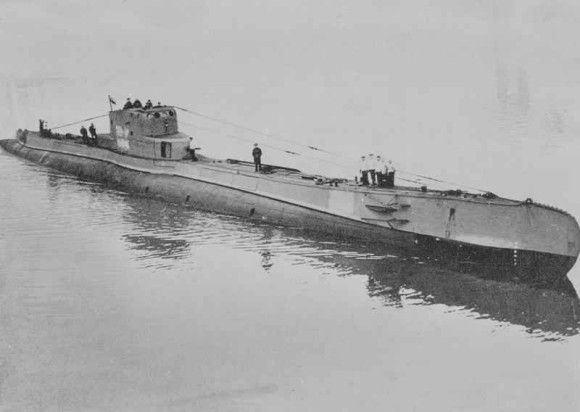
WIDEO: Defence24 Days 2025: Premier Defence & Security Conference in CEE